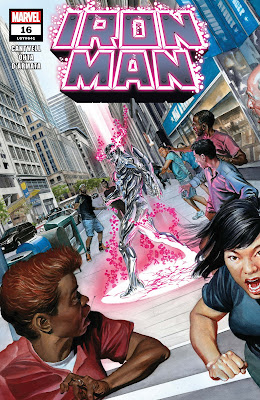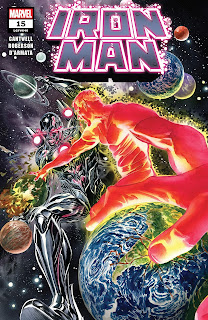from the New York Times: https://www.nytimes.com/2022/11/17/movies/the-wonder-review.html
The Wonder (2022)

By Manohla Dargis
Published Nov. 17, 2022
Updated Dec. 27, 2022
From the moment that Florence Pugh appears in the period drama “The Wonder” — seated at a table on a dimly lit ship and methodically eating from a plate while she gazes into some private horizon — you are with her. Her character, Lib Wright, looks so self-contained and so manifestly uninterested in the other passengers that you can’t help but be intrigued by her. She’ll keep you watching and interested as you follow her through this perverse, provocative story about women, their appetites and a world that barbarically tries to control them both.
A story of faith and sacrifice, “The Wonder” is a mystery wrapped in a welter of complications. Set in Ireland in 1862 — roughly a decade after the end of the Great Famine that ravaged the country, leaving an estimated one million dead — the story takes off when Lib, a nurse from London, arrives for her new and uncommon duties in a remote village. For two weeks, she is to closely observe a pious 11-year-old girl who’s said not to have eaten for four months. How the child remains alive is the puzzle that Lib briskly sets about solving, fortified by her seemingly unshakable confidence in science and an attitude of clinical detachment.
Lib’s journey to Ireland is arduous — she travels by boat, train and horse-drawn cart, her head like a prow, her face a mask of stoicism — and soon proves more existentially difficult than physically challenging. At the village, she meets her employers, a dour committee of patriarchs that includes a doctor (Toby Jones) and a priest (Ciarán Hinds). Anna O’Donnell (Kíla Lord Cassidy) does not eat, will not eat, or so it appears, they tell the incredulous Lib. Whether the fast is a miracle or a hoax, Anna has become an attraction and, as far as the men are concerned, has drawn unwanted attention from gawkers and the press.
Although some on the committee seem ready to canonize the fasting girl, others are more skeptical. Whatever the truth, Anna belongs to the ranks of women and girls who are problems in need of remedying, which is why Lib and a nun (Josie Walker) are to watch her in alternating eight-hour shifts. (Why the committee hires a British nurse remains a mystery.) Lib’s no-nonsense demeanor and grim history — she was a nurse in the Crimean War, presumably alongside Florence Nightingale — make her seem perfect for the position. That Lib is another problem becomes evident later that evening when she ingests some opium.
The Chilean director Sebastián Lelio — his credits include “Gloria,” its English-language remake “Gloria Bell” and “A Fantastic Woman” — gracefully introduces the pieces of this peculiar tale with economy, beauty, his characteristic intimacy and usual complement of memorable faces. His only real misstep is a framing device: two quasi-Brechtian scenes on a soundstage that bookend the story and announce its artifice. “The people you are about to meet, the characters, believe in their stories with complete devotion,” an offscreen woman says, as the camera glides past film equipment and splashes of color before stopping on Lib.
The voice belongs to Kitty (Niamh Algar), who’s close to the O’Donnell family and will sometime later, when in character, look at the camera and say, “Hello again. I told you we are nothing without stories.” No kidding. It’s unclear why Lelio bothered with these forced alienation effects, which are meant to compel you to think about what you’re watching (as if you ever stop thinking) rather than identify psychologically with the characters (as if that’s all viewers do). It’s a dubious move — and the assertive modern score is already doing some of that work — and generally is as stale as one of old Hollywood’s phony happy endings.
Certainly there’s already much to consider as “The Wonder” circles around questions of control — via church, state and men — and vulnerable bodies in peril. The movie is based on the novel of the same title by Emma Donoghue, who shares credit for the script with Lelio and Alice Birch. Donoghue also wrote the screen adaptation of her novel “Room,” about a mother and her young son held prisoner in a tiny shed. Although “The Wonder” is a different kind of captivity narrative, it too turns on trauma and nurturance — the care and feeding of children — and presents maternity as both an act of independence and of salvation.
Lib assumes the mantle of motherhood gradually and with enough complexity that the story never falls into predictability. It also doesn’t confuse empathy with essentialism. Although she warms toward Anna (how could she not?) and also takes up with a journalist (Tom Burke), creating an allegorical family unit, the character remains convincingly sovereign throughout. Anchored by Lelio’s intelligent filmmaking — and by Pugh’s beautifully calibrated mix of physical vigor and temperamental astringency — Lib embodies the story’s arguments, themes and power with vivid clarity. There’s no denying her or her ravenous hunger for life.
The Wonder
Rated R for extreme bodily peril and forced feeding. Running time: 1 hour 48 minutes. Watch on Netflix.
A correction was made on
Dec. 27, 2022:
An earlier version of this article misstated the title of the novel Emma Donoghue wrote and adapted for screen. It is “Room,” not “The Room.”







